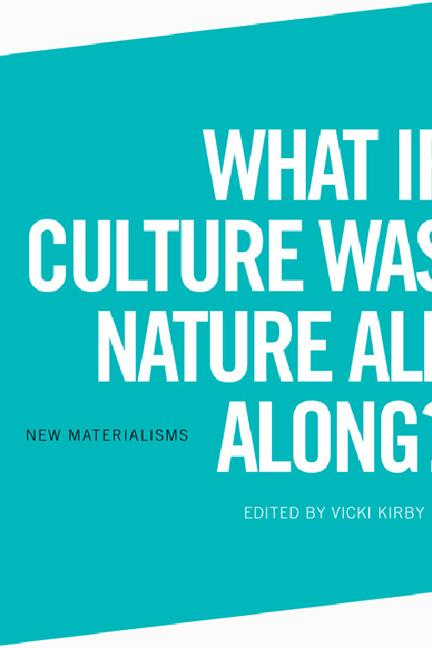Book contents
- Frontmatter
- Contents
- Acknowledgements
- Foreword
- 1 Matter out of Place: ‘New Materialism’ in Review
- 2 Method Matters: The Ethics of Exclusion
- 3 Sensory Substitution: The Plasticity of the Eye/I
- 4 Allergy as the Puzzle of Causality
- 5 Pregnant Men: Paternal Postnatal Depression and a Culture of Hormones
- 6 Material Culture: Epigenetics and the Molecularisation of the Social
- 7 Racialised Visual Encounters
- 8 Microbiology as Sociology: The Strange Sociality of Slime
- 9 Nature Represents Itself: Bibliophilia in a Changing Climate
- 10 Climate Change, Socially Synchronised: Are We Really Running out of Time?
- 11 A Sociality of Death: Towards a New Materialist Politics and Ethics of Life Itself
- Notes on Contributors
- Index
8 - Microbiology as Sociology: The Strange Sociality of Slime
Published online by Cambridge University Press: 22 December 2017
- Frontmatter
- Contents
- Acknowledgements
- Foreword
- 1 Matter out of Place: ‘New Materialism’ in Review
- 2 Method Matters: The Ethics of Exclusion
- 3 Sensory Substitution: The Plasticity of the Eye/I
- 4 Allergy as the Puzzle of Causality
- 5 Pregnant Men: Paternal Postnatal Depression and a Culture of Hormones
- 6 Material Culture: Epigenetics and the Molecularisation of the Social
- 7 Racialised Visual Encounters
- 8 Microbiology as Sociology: The Strange Sociality of Slime
- 9 Nature Represents Itself: Bibliophilia in a Changing Climate
- 10 Climate Change, Socially Synchronised: Are We Really Running out of Time?
- 11 A Sociality of Death: Towards a New Materialist Politics and Ethics of Life Itself
- Notes on Contributors
- Index
Summary
The attribution of consciousness has always been the bedrock of how we understand and compare species being. Evolution's prized end product, it is the most prominent marker of the profound difference that identifies human achievement. Consciousness markers such as cognition, language and memory are considered to be either specific to the human, or most complex and superior in their human manifestations. That is, human consciousness is understood as consciousness, or, consciousness perfected. It seems fair to say that little has changed on this front since Descartes's famous dictum, ‘Cogito ergo sum’. The human is still unquestionably considered the rational animal.
However, more recently there have been broad, interdisciplinary moves to refine our understanding of the nature of consciousness. Although productive, discourses such as animal studies and posthumanism have a tendency to rely on the logic of supplementarity for their interventionary impetus, adding or subtracting certain abilities in order to make things right. Within this framing of the problematic, the attribution of agency, for example, might be distributed to other creatures.
However such redemptive gestures, which aim to transfer to the animal what were previously considered human capacities, inadvertently recuperate the very logic of anthropocentrism they claim to contest. Although the denial of cognitive capacities to animals is a political determination that is certainly questionable, it may prove that the confirmation of animal cognition is equally problematic. To grant intelligence to animals, even in an attenuated or calibrated form, continues to use a very anthropocentric understanding of intelligence as a comparative yardstick: it subsumes animal difference into a particular normative template. More to the point, it leaves the dilemma of what, exactly, we mean by intelligence very much intact – something to be affirmed or denied rather than questioned. Further, these theoretical sleights of hand make it difficult to pose a more fundamental question, namely, why the determination to locate and aggressively defend such criteria persists.
My attempt to dilate upon the subject of consciousness from a different vantage point, using slime moulds as a heuristic, provokes this foray into the natural sciences. Underpinning my interest in rethinking the human/animal divide is its corollary, the two cultures problem, whose founding supposition contends that the study of culture can be neatly isolated from the scientific study of the natural world.
- Type
- Chapter
- Information
- What if Culture was Nature all Along? , pp. 153 - 178Publisher: Edinburgh University PressPrint publication year: 2017



